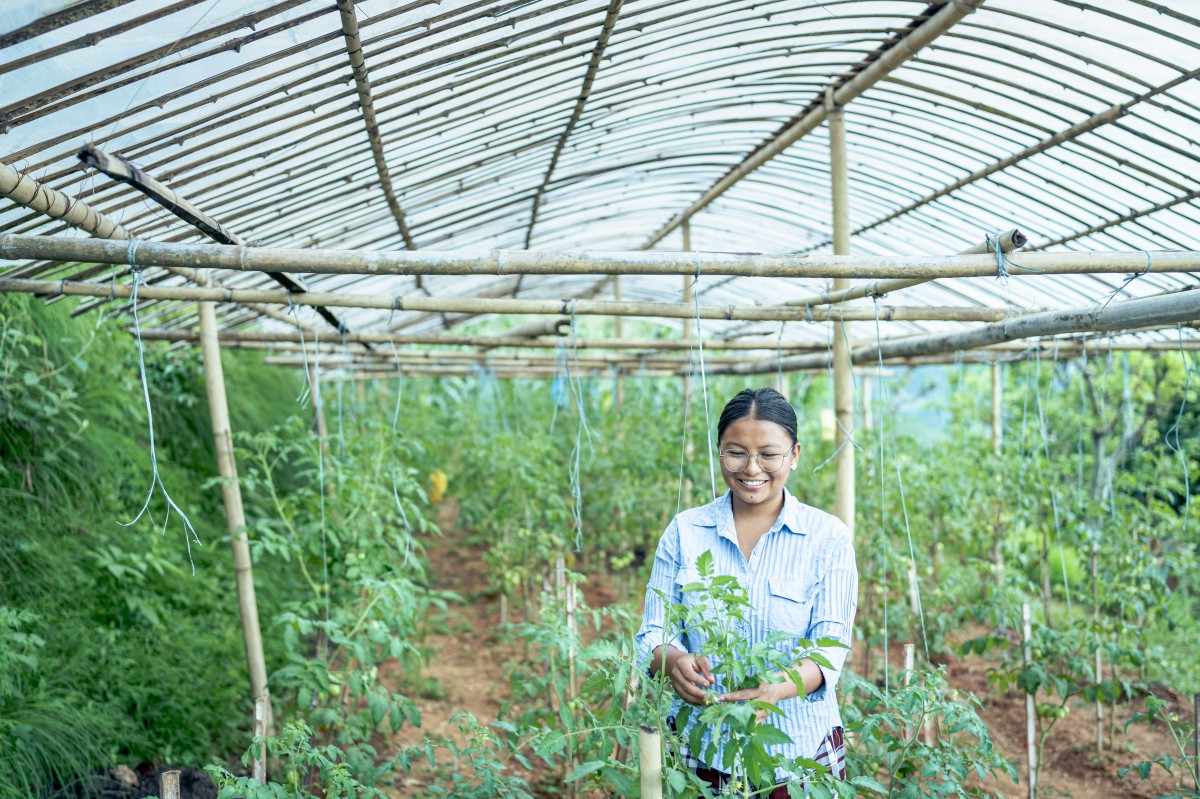On a bright summer day this July in Moli village of Okhaldhunga district, 22-year-old Dil Kumari Rai was harvesting ripe tomatoes while her neighbors were just beginning to plant. Thanks to a simple farming tunnel, she was cultivating off-season, high-demand crops, earning double the standard market price. “There are only a handful of farmers who cultivate off-season tomatoes here,” she said. “That’s why we are able to get a higher price.”
This advantage, however, is not just about income; it’s about a profound transformation. For Dil Kumari and many others living in the hills of Okhaldhunga and Khotang, this new approach to agriculture - with a pilot project implemented by the Department of Forests and Soil Conservation, Ministry of Forests and Environment, and support from the UNDP’s Developing Climate Resilient Livelihoods in the Vulnerable Watershed in Nepal (DCRL) project - has become a source of financial independence, community respect, and newfound dreams.
For farmers in Moli who received the simple plastic farming tunnel, the intervention has been a game changer in terms of cropping patterns. “Besides benefiting from off-season prices, the tunnels also protect the tomatoes from heavy rain, to which they are very sensitive,” she said.
Moli did not have an irrigation system. They would plant maize and millet during the monsoon. Once the monsoon was over, farming fields would stay abandoned for the rest of the year.
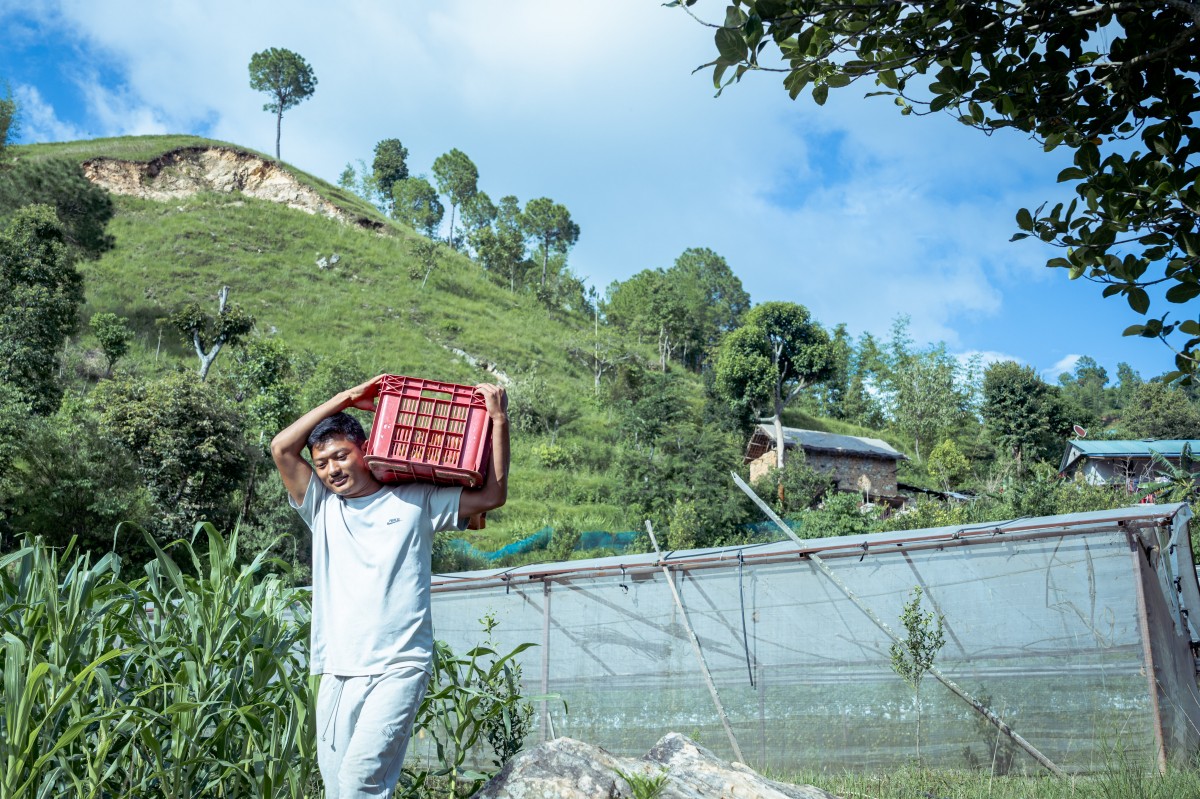
In 2022, Moli farmers started to hear from the Manebhanjyang Rural Municipality’s ward office about how farmers in downstream Nepane village were receiving water source protection as well as plastic tunnels from the DCRL project. They immediately put in a request with the ward chair for similar support for themselves. “The ward chair advised us to reform the village women-led executive committee as our Rai community prioritizes women leadership, from household work to public spaces,” said Dil Kumari. “This is how I was chosen as the group leader of 35 household farmers comprising the Moli Agriculture and Livestock Farming Group.”
Hearing from farmers who are reaping the benefits of their association with DCRL, a project with an objective to train households on alternative farming techniques and ways to protect and use water efficiently, is to understand how a technical project can have such a transformative impact on breaking down gender- and caste-based barriers and lead to societies that are more equitable and have more women and marginalized groups in leadership roles.
Dil Kumari’s own journey has not been an easy one. Her father passed away when she was very young. She and her brother were raised by her mother, who sold homemade liquor and borrowed money to make ends meet. For someone who has lived through such hardship, the changes brought on by technical training and a farming tunnel feel unreal.
“We were not aware of water storage techniques or how to use water efficiently. We would fetch drinking water from our limited spring taps but even with the water pipes extended to our homes, the winter drought would cause neighbors to fight. Now the water source protection alone helps to run individual taps for all 35 households” said Dil Kumari.
With the water scarcity largely resolved, Dil Kumari’s family now grows all-season vegetables in the tunnels, and also rears pigs and goats. The impacts are obvious. Her brother is studying in Kathmandu and she herself was able to resume her education and complete her bachelor’s degree. While many friends suggested she go abroad, Dil Kumari feels there is potential to achieve more by scaling up farming and creating more income-generating opportunities in Moli. “I want to make farming into a profession,” she said, even as she is aware of how bad the roads connecting Moli and its produce to Okhaldhunga bazaar are. “Farmers here would really benefit if there were a collection center as well as a cold storage,” she said.
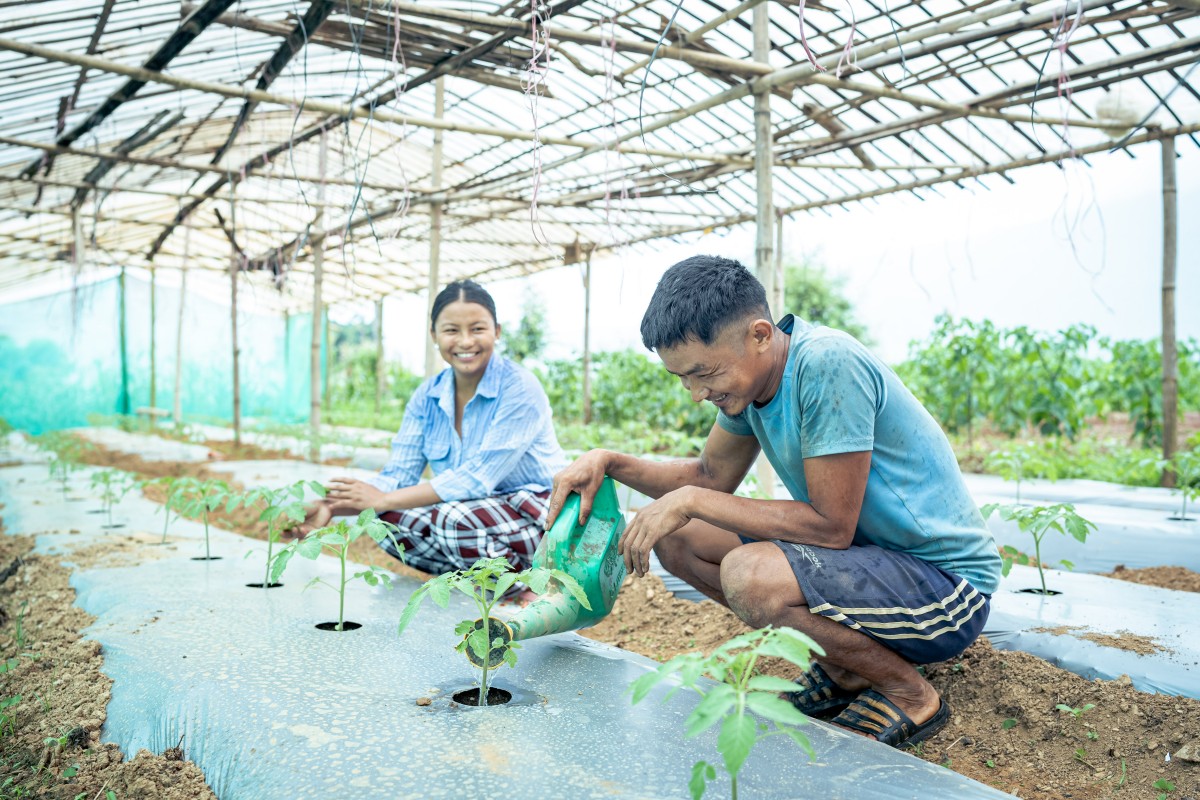
“Dil Kumari and I were looking to find ways to earn more. When we heard of the DCRL project’s farming and water-related interventions, we pounced on the opportunity,” said Rajita Rai, Dil Kumari’s friend and the treasurer of the farmers group.
Like Dil Kumari, Rajita has also seen her share of hardships. Previously dependent on her husband's daily wage work, her kitchen garden would stay abandoned all winter. After receiving a tunnel, training, and irrigation support from DCRL, she began cultivating profitable crops like tomatoes and chilies year-round. Now, Rajita earns Rs 60,000 from a single tomato harvest, which she does twice a year. “We used to depend entirely on my husband’s income,” she said. “But since I started vegetable farming, we have not had to depend on others anymore.”
While most farmers groups only function to distribute government-provided seeds and saplings, DCRL support and Rajita’s leadership have enabled these groups to become a useful channel for disseminating information about capacity-building skills for farming, support for water source protection, contour trench construction, irrigation ponds, plastic ponds, rainwater harvesting systems, and plastic tunnels.
Through their own resolve and by recognizing how smarter farming could turn around their fortunes, this young women-led group has created a vibrant farming community. Dil Kumari and Rajita continue to support other farmers to qualify for agricultural grants and have also successfully encouraged reluctant male farmers to participate in the farming training and take advantage of DCRL support.
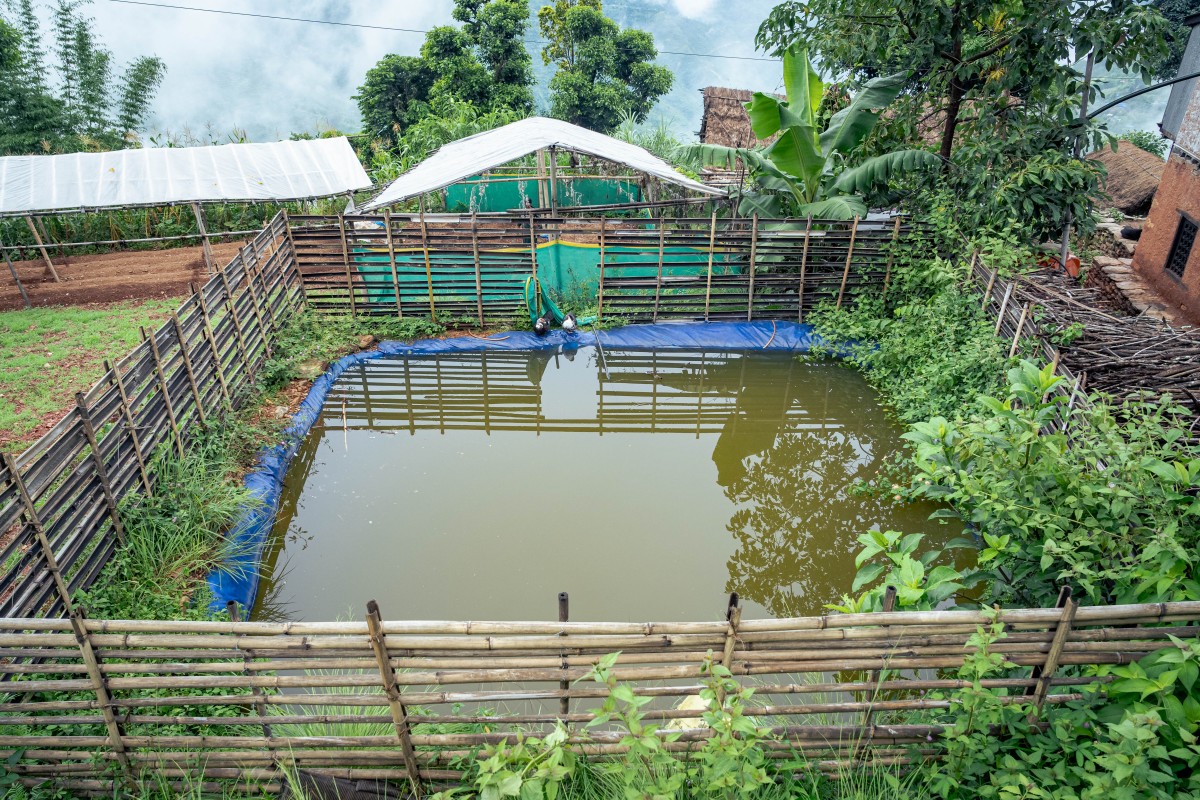
Dipraj Rai, 31, used to work as a daily wage worker in Pokhara. His return to Moli coincided with the start of the DCRL project’s work in his village. His first harvest of tomatoes after receiving two tunnels from DCRL fetched him Rs 70,000. He used part of this money to buy a third farming tunnel as well as a second-hand motorbike to carry his produce to the market. Besides tomatoes, Dipraj also cultivates akabare chilies, a popular variety known for its intensity. Encouraged by his own progress, the former daily wage worker is now planning to scale up to 10 tunnels.
While Dipraj’s parents used to grow rainfed maize and millet once a year, he is now able to cultivate tomatoes twice a year, which are ready to go to market in just two months. This makes time for Dipraj to also plant beans, cucumber, varieties of spinach, radish and other vegetables in the tunnel. “In Pokhara, I was only earning as long as I was working. But here, even as I am earning more, I still have time to perform household chores and spend time with my family. The DCRL project has really helped me live the life that I always dreamed of.”
Over in Siddhicharan Municipality, Okhaldhunga, a farmers group found itself led and influenced by Ramila Pariyar, 22, a Dalit woman farmer. The 19 Dalit farmer households in Tinpiple had always been hesitant about taking their produce to the m farmers group arket. Ramila became their trailblazer, as the first farmer from the group to sell tomatoes from her first tunnel harvest at the local Nishankhe Bazaar. She used the Rs 15,000 she earned from the sale to start yet another business, a small shop in the village to sell everyday essentials. Ramila’s early success encouraged her husband Bhupendra Pariyar, who used to work as a seasonal daily-wage worker, to switch back to farming. “Our family of three, including our three-year-old, used to survive on my husband’s wages, about Rs 1,000 per day,” Ramila said. “If he didn’t get his wage on time, we would skip meals. Now we don’t have to worry about where our next meal is coming from.”
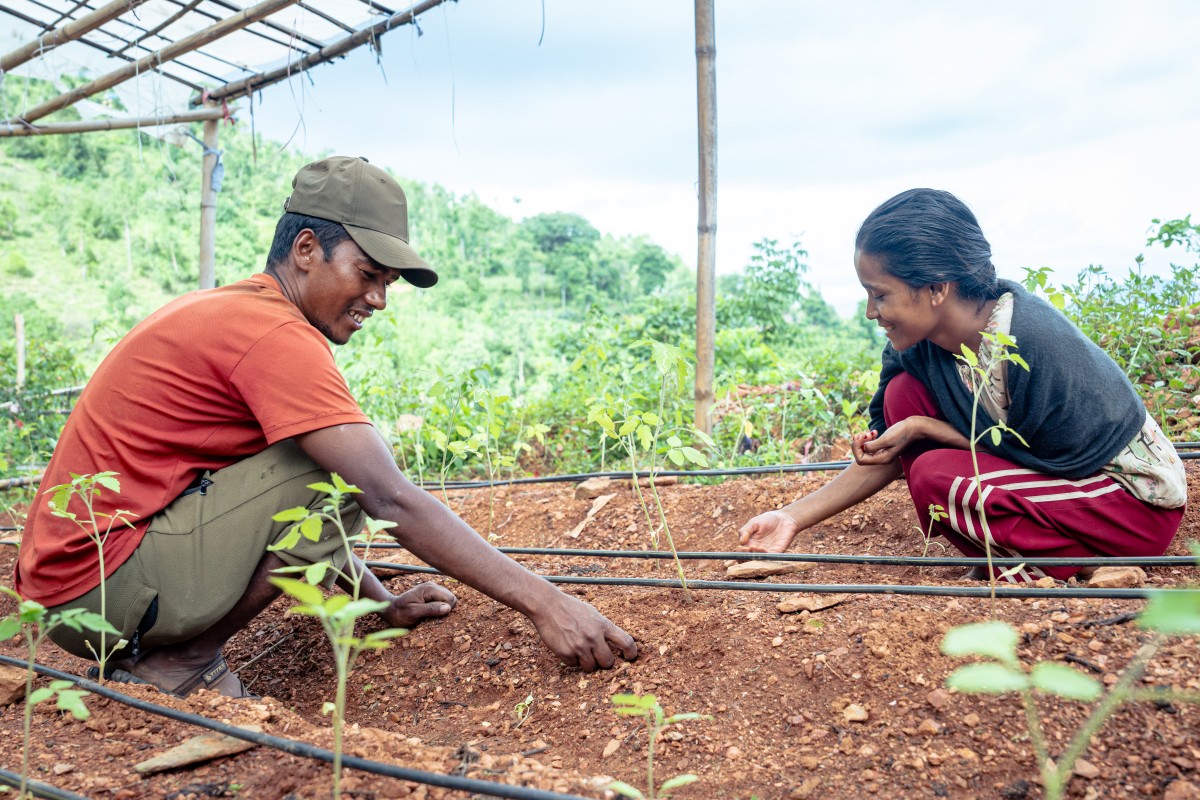
Ramila and Bhupendra expanded the number of tunnels they owned, and the vegetables they planted to include tomato, bitter gourd, chayote, turmeric, spinach, luffa gourd, bottle gourd, and beans. This year, they saved enough to move from their earlier tiny living space into their own new home, where they also plan to expand their shop. They take most pride in creating jobs for others in the village.
With tunnel farming thriving in Siddhicharan Municipality, many households started to earn enough to put aside some savings. Ramila herself deposited her savings into the Taluwa Women’s Multipurpose Cooperative, a mother’s group as well as a microfinance entity. Women members of the 10-year-old Taluwa cooperative have doubled their monthly savings from Rs 50 to over Rs 100. Ramila and other farmers like her now believe that their newfound economic empowerment has also lent them bargaining power that was previously nonexistent. “The DCRL project has helped us gain confidence to speak up, claim our rights, and earn from our own land. Now, when a committee needs to be formed in the village, we Dalits are encouraged to take the lead. Earlier, members of the so-called upper caste wouldn’t even inform us about these opportunities,” said Bhupendra.
In neighboring Khotang district, Hira Shrestha, chair of the Gurungdhara Kafle Conservation Farming Group in Salle village of Halesi Tuwachung Municipality, is another farmer who has achieved exemplary success with the DCRL project’s support. For many years, 40-year-old Hira used to bear her household expenses as well as the cost of educating her two children, while her husband Bharat Shrestha worked as a migrant laborer in the Middle East. She depended on the few goats she raised as well as the chilies she grew to make ends meet. When her husband came back home with no money after years living abroad, they decided to make a fresh start. “We did not give up after failure. We were at zero with children to raise. We had no money to scale up farming, but we still had our dreams,” he said.
It was then that they heard of DCRL, which ended up changing their lives. Shifting to growing vegetables in four farming tunnels including the three that the DCRL project provided and with the use of a micro irrigation pond, Hira and her husband now grow enough vegetables to sell at the local market every week, throughout the year. “There hasn’t been a single week when we haven’t sold something,” said Hira.
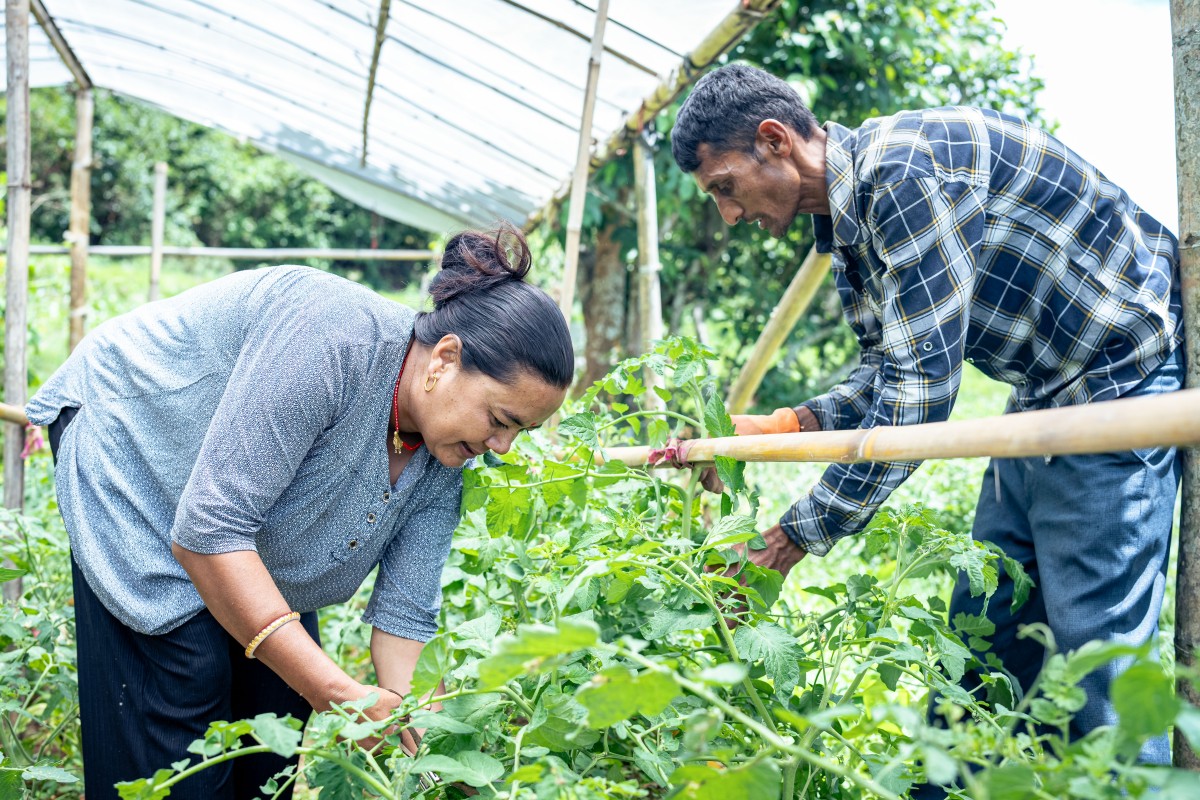
Encouraged by their success, the couple invested their own money into mushroom and fish farming. “We earn around Rs 200,000 per year from our vegetables and around Rs 45,000 from livestock. The money is much better than what I was earning abroad,” said Bharat. Last year, they also earned Rs 30,000 from lemons planted on previously barren land. This success has enabled them to invest in their daughter's higher education in Kathmandu.
Hira attributes the DCRL project for her growth, which provided training in vegetable and fish farming. “Before, I was just someone's daughter-in-law and wife. Now, through capacity-building and leading various groups, I feel like I have built my own identity,” she said. In recognition of her contributions, Hira was honored by her municipality on International Women's Day with a certificate and a cash prize of Rs 25,000.
Reflecting on the impact created by the DCRL project, Mayor of Halesi Tuwachung Municipality Bimala Rai expressed gratitude for its support in addressing water scarcity. “Today, almost every household in our villages has an irrigation pond, including for rainwater harvesting,” she said. This success prompted the municipality to help an additional 112 households build their own ponds. Mayor Rai also highlighted how women are now actively engaged in income-generating activities. “Earlier, most village women could not introduce themselves at mother’s group meetings. Today, the same women speak up to demand budget allocations,” she said.
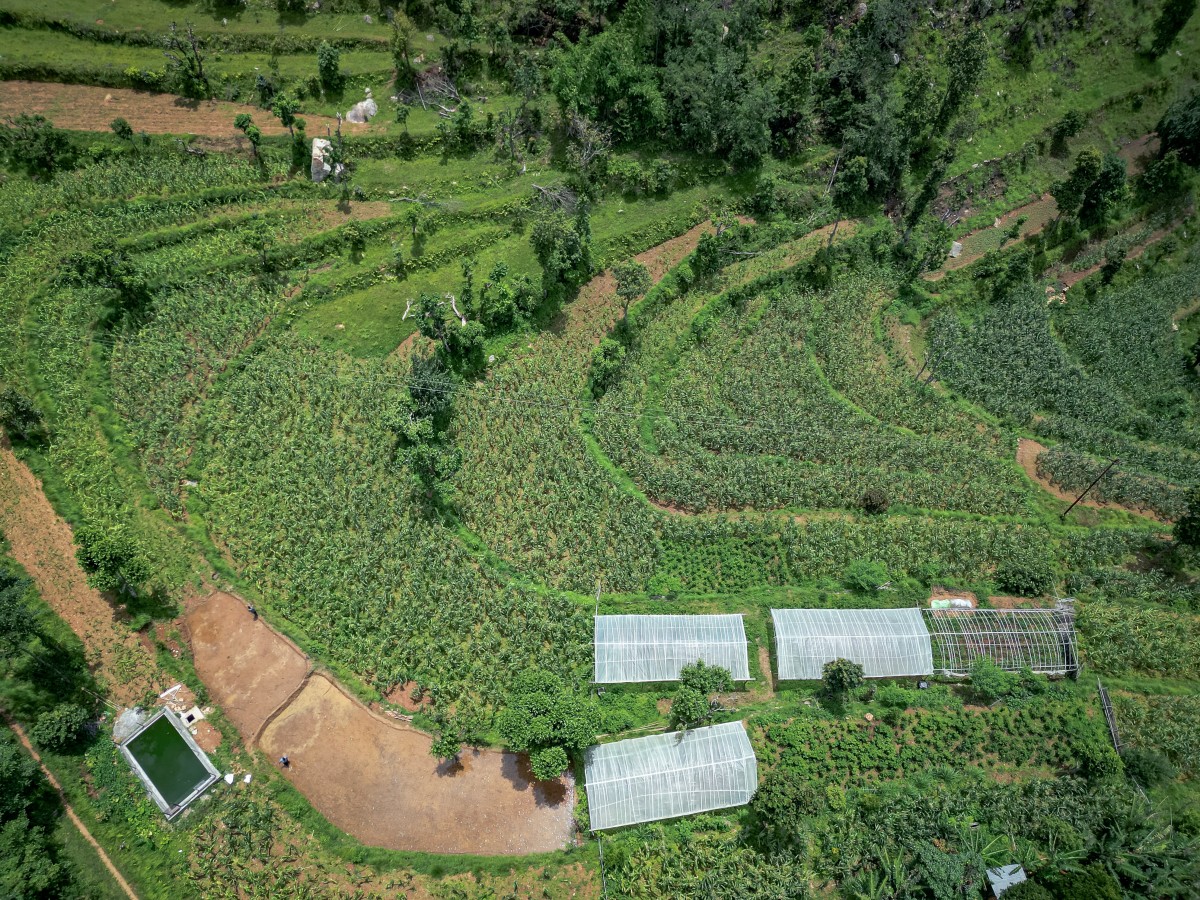
The project has contributed significantly toward addressing structural inequalities. An impact evaluation revealed that 76 percent of direct beneficiaries were from Janajati and Dalit households. Furthermore, women assumed over half the leadership roles in DCRL-supported farmers groups and comprised nearly half of all participants at climate-smart agriculture training events. Consequently, eight municipalities have institutionalized integrated watershed management in their local planning, ensuring women and marginalized communities are represented in natural resource management.
The DCRL project was implemented with financial support from the Global Environment Facility (GEF) - Least Developed Countries Fund (LDCF), and technical support from the UNDP in Nepal.
